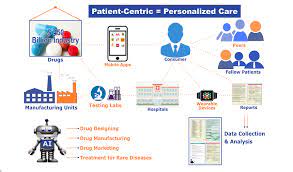Introduction
The pharmaceutical industry stands on the cusp of a technological revolution with the integration of Artificial Intelligence (AI) into drug manufacturing and quality control processes. This article explores the multifaceted role of AI in revolutionizing drug production, ensuring quality and efficiency, and ultimately contributing to advancements in healthcare.
Drug Discovery and Design
AI accelerates drug discovery by sifting through vast datasets to identify potential drug candidates. Machine learning algorithms analyze biological data, predict molecular interactions, and generate insights that streamline the drug design process. This not only expedites research but also increases the likelihood of discovering novel and effective pharmaceuticals.
Process Optimization and Efficiency
In drug manufacturing, AI plays a pivotal role in optimizing production processes. Machine learning models analyze data from manufacturing workflows, identifying patterns and opportunities for efficiency improvement. This results in streamlined operations, reduced production costs, and faster time-to-market for new medications.
Predictive Maintenance in Manufacturing
AI facilitates predictive maintenance in pharmaceutical manufacturing plants. By analyzing data from equipment sensors, machine learning algorithms predict when machinery is likely to fail or require maintenance. This proactive approach minimizes downtime, ensures production continuity, and enhances overall manufacturing efficiency.
Quality Control and Assurance
Ensuring the quality of pharmaceutical products is paramount, and AI transforms the landscape of quality control. Computer vision systems powered by AI can analyze visual characteristics of drugs, detecting deviations from quality standards that may be imperceptible to the human eye. This results in a more robust quality assurance process.
Real-time Monitoring and Adaptive Control
AI enables real-time monitoring of manufacturing processes, providing instantaneous feedback on variables such as temperature, pressure, and chemical concentrations. This capability allows for adaptive control, where AI algorithms can make instant adjustments to maintain optimal conditions, ensuring the production of high-quality drugs.
Drug Formulation and Dosage Optimization
AI contributes to the optimization of drug formulations and dosages. Machine learning models analyze patient data, genetic information, and clinical trial results to tailor drug formulations for individualized treatments. This personalized approach enhances drug efficacy and minimizes adverse effects.
Supply Chain Management
AI enhances supply chain management in the pharmaceutical industry. Predictive analytics models forecast demand, optimize inventory levels, and identify potential disruptions in the supply chain. This proactive management minimizes the risk of shortages and ensures a steady and efficient flow of pharmaceutical products.
Compliance and Regulatory Alignment
Ensuring compliance with regulatory standards is critical in the pharmaceutical industry. AI-driven systems can automate compliance checks, ensuring that manufacturing processes adhere to stringent regulations. This not only expedites regulatory approvals but also enhances overall product safety and reliability.
Data Security and Integrity
The vast amount of data generated in drug manufacturing and quality control processes necessitates robust data security measures. AI contributes to data security by implementing encryption, access controls, and anomaly detection, safeguarding sensitive information and maintaining data integrity throughout the pharmaceutical lifecycle.
Continuous Improvement through Feedback Loops
AI creates a feedback loop for continuous improvement in drug manufacturing. By analyzing production data, machine learning models identify areas for enhancement, whether in the formulation process, equipment efficiency, or quality control measures. This iterative process ensures ongoing optimization and innovation.
Conclusion
In conclusion, the integration of AI in drug manufacturing and quality control represents a transformative leap for the pharmaceutical industry. From accelerating drug discovery to optimizing manufacturing processes and ensuring stringent quality control, AI’s role is multi-faceted. As technology continues to advance, the synergy between AI and pharmaceuticals holds promise for delivering safer, more effective medications to patients and driving advancements in healthcare. The continuous evolution of AI applications in drug manufacturing signifies a future where innovation and efficiency converge for the betterment of global health.

